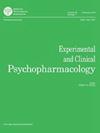在成人临床样本中,无酒精活动在酒精使用障碍康复过程中的相对强化价值的作用。
IF 2.4
3区 医学
Q3 PHARMACOLOGY & PHARMACY
引用次数: 0
摘要
行为经济学理论已被广泛应用于理解酒精使用障碍(AUD)。行为经济学理论的应用将 AUD 概念化为一种长期有害饮酒的模式,在这种模式中,在饮酒或从事无酒活动之间的选择更倾向于饮酒。与此相反,康复需要持续转向选择有回报的无酒活动模式。本研究通过对 MATCH 项目数据的二次分析,研究了无酒精活动参与度和参与这些活动的相对强化值(RRV)是否能预测 AUD 的治疗结果。MATCH 项目是一项多地点随机临床试验,研究 AUD 的行为疗法(N = 1,279 人,75.8% 为男性,81.0% 为非西班牙裔白人,9.5% 为黑人,7.7% 为西班牙裔/拉丁美洲人,1.5% 为美国印第安人/阿拉斯加原住民,< 1% 为亚裔美国人,以及其他种族/族裔)。回归分析表明,在治疗后 6 个月,每多报告一次不饮酒活动,饮酒天数就会减少 7%,大量饮酒天数就会减少 5%,每次饮酒天数就会减少大约一次,而且在治疗后 12 个月,抑郁、生活目的和社会心理功能都会得到显著改善。与行为经济学理论相一致的是,较高的无酒精活动RRV也预示着饮酒量的显著减少和功能的改善,而且这些关联比仅针对无酒精活动频率的结果更强。研究结果强调了了解有利于康复的环境背景的重要性,并支持提高无酒精活动参与度和参与此类活动的RRV的价值,以促进AUD患者减少饮酒和改善功能。(PsycInfo Database Record (c) 2024 APA,保留所有权利)。本文章由计算机程序翻译,如有差异,请以英文原文为准。
Role of relative-reinforcement value of alcohol-free activities during recovery from alcohol use disorder in an adult clinical sample.
Behavioral economic theory has been extensively applied to understand alcohol use disorder (AUD). Applications of behavioral economic theory conceptualize AUD as a pattern of harmful alcohol use over extended periods of time in which choices between drinking or engaging in alcohol-free activities favor drinking. Recovery, in contrast, entails a sustained shift toward a pattern of selecting rewarding alcohol-free activities. The present study examined whether alcohol-free activity engagement and the relative-reinforcement value (RRV) of engaging in those activities predicted AUD treatment outcomes via secondary analysis of data from Project MATCH, a multisite randomized clinical trial examining behavioral treatments for AUD (N = 1,279, 75.8% male, 81.0% non-Hispanic White, 9.5% Black, 7.7% Hispanic/Latino, 1.5% American Indian/Alaska Native, < 1% Asian American, and other race/ethnicity). Regression analyses indicated that every additional alcohol-free activity reported at 6 months posttreatment was associated with 7% fewer drinking days, 5% fewer heavy drinking days, and approximately one less drink per drinking day, as well as with significant improvements in depression, purpose in life, and psychosocial functioning at 12 months following treatment. Consistent with behavioral economic theory, higher RRV of alcohol-free activities also predicted significant reductions in drinking and improvements in functioning, and these associations were stronger compared to results for alcohol-free activity frequency only. The findings highlight the importance of understanding environmental contexts conducive to recovery and support the value of increasing alcohol-free activity engagement and the RRV of engaging in such activities to facilitate reductions in drinking and improved functioning among individuals with AUD. (PsycInfo Database Record (c) 2024 APA, all rights reserved).
求助全文
通过发布文献求助,成功后即可免费获取论文全文。
去求助
来源期刊
CiteScore
4.20
自引率
8.70%
发文量
164
审稿时长
6-12 weeks
期刊介绍:
Experimental and Clinical Psychopharmacology publishes advances in translational and interdisciplinary research on psychopharmacology, broadly defined, and/or substance abuse.

 求助内容:
求助内容: 应助结果提醒方式:
应助结果提醒方式:


